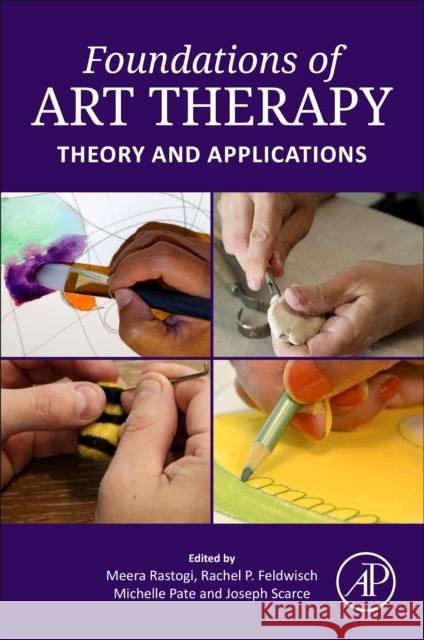Foundations of Art Therapy: Theory and Applications » książka



Foundations of Art Therapy: Theory and Applications
ISBN-13: 9780128243084 / Angielski / Miękka / 2022
Foundations of Art Therapy: Theory and Applications
ISBN-13: 9780128243084 / Angielski / Miękka / 2022
(netto: 536,42 VAT: 5%)
Najniższa cena z 30 dni: 555,21
ok. 30 dni roboczych.
Darmowa dostawa!
Wydanie ilustrowane
"Meera Rastogi, Rachel Feldwisch, Michelle Pate and Joseph Scarce have compiled an excellent text suited for undergraduate art therapy studies. The breadth of book topics, spanning from art therapy history to contemporary influences on art therapy research and practices, provides teachers and students with a comprehensive overview of the field and makes teaching and learning foundational knowledge accessible. I wish I had a text like this when I began teaching undergraduate art therapy students many years ago!" -- Barbara Parker-Bell, Psy.D., ATR-BC, Director of Art Therapy, FSU Art Therapy Programs
"I enthusiastically endorse the "Foundations of Art Therapy: Theory and Applications" book for providing the most historically accurate, inclusive, and comprehensive overview of the profession that has been published to date. This book contains an impressive breadth and depth of detailed and integrated information, including full color photos, informative charts, and case examples about the field of art therapy. The book is masterfully written in clear and concise language to appeal to a diverse readership by a wide range of credentialed art therapy authors and editors. "Foundations of Art Therapy: Theory and Applications," would make an excellent introduction to art therapy text book and resource for undergraduate studies and for practitioners in related mental health professions." -- Wayne Ramirez, MFA, MS, ATR-R, Founding President of the Wisconsin Art Therapy Association (first Art Therapy Association established and incorporated in the USA).
"This introduction to the field of art therapy, with chapters written by professionals teaching in undergraduate programs, is a most welcome addition to the literature. It is especially timely because it includes information about individuals, approaches, and activities that have been insufficiently recognized, and are highly relevant for 21st century practice of the discipline." -- Judith A. Rubin, PhD, ATR-BC, HLM, Founder, Expressive Media Film Library
"The authors are obviously well informed and familiar with the subjects in the chapters that they write. I love the outside resources they provide for those who want to dive into a specific topic as well as case study examples. One thing that may be nice in the future might be like an audio version that can be used alongside the text." -- Undergraduate Student, Temple University
"I think the book works well because it has a lot of diagrams and pictures that help explain the key concepts mentioned in the book." -- Undergraduate Student, Temple University
Part I: Fundamentals of Art Therapy: Prepping the Canvas 1. History, Profession, and Ethics of Art Therapy 2. Understanding Media: Laying the Groundwork for Art Making 3. Multicultural and Diversity Perspectives in Art Therapy: Transforming Image into Substance 4. Intersections of Neuroscience and Art Therapy 5. Approaches to Research in Art Therapy
Part II: Theoretical Orientations: Gathering the Tools 6. Overview of Theoretical Orientations 7. Psychoanalytic and Jungian Approaches to Art Therapy 8. Humanistic Approaches to Art Therapy: Existentialism, Person-Centered, and Gestalt 9. Using Art to Think and Rethink: Cognitive-behavior Therapy from Behaviorism Through the Third Wave
Part III: Art Therapy with Specific Populations: Painting the Picture 10. Child Development and Artistic Development in Art Therapy 11. Art Therapy for Psychological Disorders and Mental Health 12. Art Therapy and Older Adults 13. Art Therapy with Trauma Recovery and Response
Part IV: Profession of Art Therapy: Exhibiting the Work 14. Beginning Concepts of Group Work 15. Community-based Art Therapy and Community Arts 16. Pathways to Developing a Career in Art Therapy
Meera Rastogi, PhD, MAAT, ATR-BC, CGP, is a licensed psychologist, board certified art therapist, certified group psychotherapist, and professor at the University of Cincinnati, Clermont College. She teaches in the psychology program and directs the University's Pre-Art Therapy Certificate Program. Dr. Rastogi offers weekly art therapy groups for people with chronic illness and people focused on mental health recovery. Her research interests include the intersections between psychology, neuroscience, and art therapy, art therapy and mental health conditions, and higher education. Rachel P. Feldwisch, PhD, MAAT, LMHC, ATR-BC, is a board certified art therapist, Licensed Mental Health Counselor, and Licensed School Counselor. She worked as an art therapist and counselor for about a decade before returning to graduate school for a PhD in Counseling Psychology. She is currently the Director of Counseling Programs at the University of Indianapolis where she oversees the graduate and undergraduate art therapy programs, provides art therapy training, and conducts research in art therapy, counseling, and trauma-informed practice. Michelle Pate, DAT, LCMHC, ATR-BC, holds a Doctorate in Art Therapy from Mount Mary University, is a board certified art therapist and Licensed Clinical Mental Health Counselor. She teaches undergraduate art therapy at Lesley University and currently chairs the AATA Education Committee and co-chairs the AATA Undergraduate Education sub-committee. Her current research focus is on the inclusion of diversity in the undergraduate education curriculum. Joseph Scarce, PhD, ATR-BC, provides art therapy to medical hospitals, substance abuse facilities, and edited the first book on art therapy in disaster response, Art Therapy in Response to Natural Disasters Mass Violence and Crisis. He is an assistant professor at The University of Tampa and coordinates the BA in Art Therapy program. He partners with the Tampa Museum of Art working with The University of Tampa undergraduate students to provide art therapy to underserved populations through the Art Space Program.
1997-2026 DolnySlask.com Agencja Internetowa
KrainaKsiazek.PL - Księgarnia Internetowa









